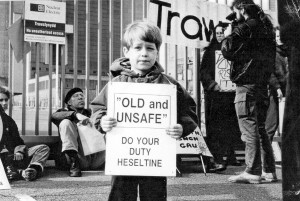Science & Policy Making
Ethics of non-violent Direct Action
Philosophers have interpreted the world in various ways; the point, however, is to change it.
This is a sentiment which is shared by the researchers at Green Audit. Although much of our energy is spent in analysing the problem and providing scientific and empirically based research, we are concerned that our project should not be limited to this work. Our intention is to change the world we live in for the better.
This area of the site describes Green Audit’s work in investigating why the political process fails in practice, and making suggestions to improve it.
It is clear that scientific advice to government is failing: evidence ranging from BSE to GM food makes it clear that this is the case. We wondered what was going wrong and our exploration led to the writing of I Don’t Know Much About Science. This paper explores whether MPs are competent to make decisions in these areas, how independent the advice they are given is, and why the committees that give it to them are inadequate and biased.
Since so much of our work is scientifically based we have confronted head on the intractability of the scientific paradigm. In our naivety we believed that if we found the Truth scientifically then policies would be forced to change. But we have learned that in this particular dialogue Power is more important. Speaking truth to power is a Quaker commitment which we have found valuable. It may lead one to take non-violent direct action (NVDA) as a more effective way of achieving political change. Green Audit’s philosophical justification for NVDA is presented in Chris Busby’s speech to the Ethical Society in London.
What happens when you try to speak truth to power? We have found that it is psychologically and culturally difficult to do. It is hard to maintain your position when confronted with such strength of opposition. The subtle process of acculturation and subversion of a radical message that can take place is explored in All We Like Sheep by Molly Scott Cato. In How Powerful is Our Democracy Chris Busby explores how difficult it is for us to challenge the culture we have grown up with in our everyday lives.
Why, when it is so clear that the way we live is destroying our planet, is it so difficult for politicians to change? The Kyoto Conference exposed the impotence of international policy-makers in the face of the major environmental challenge: global warming. The Appeal of a Low-Energy Position presents a novel view of Kyoto.


